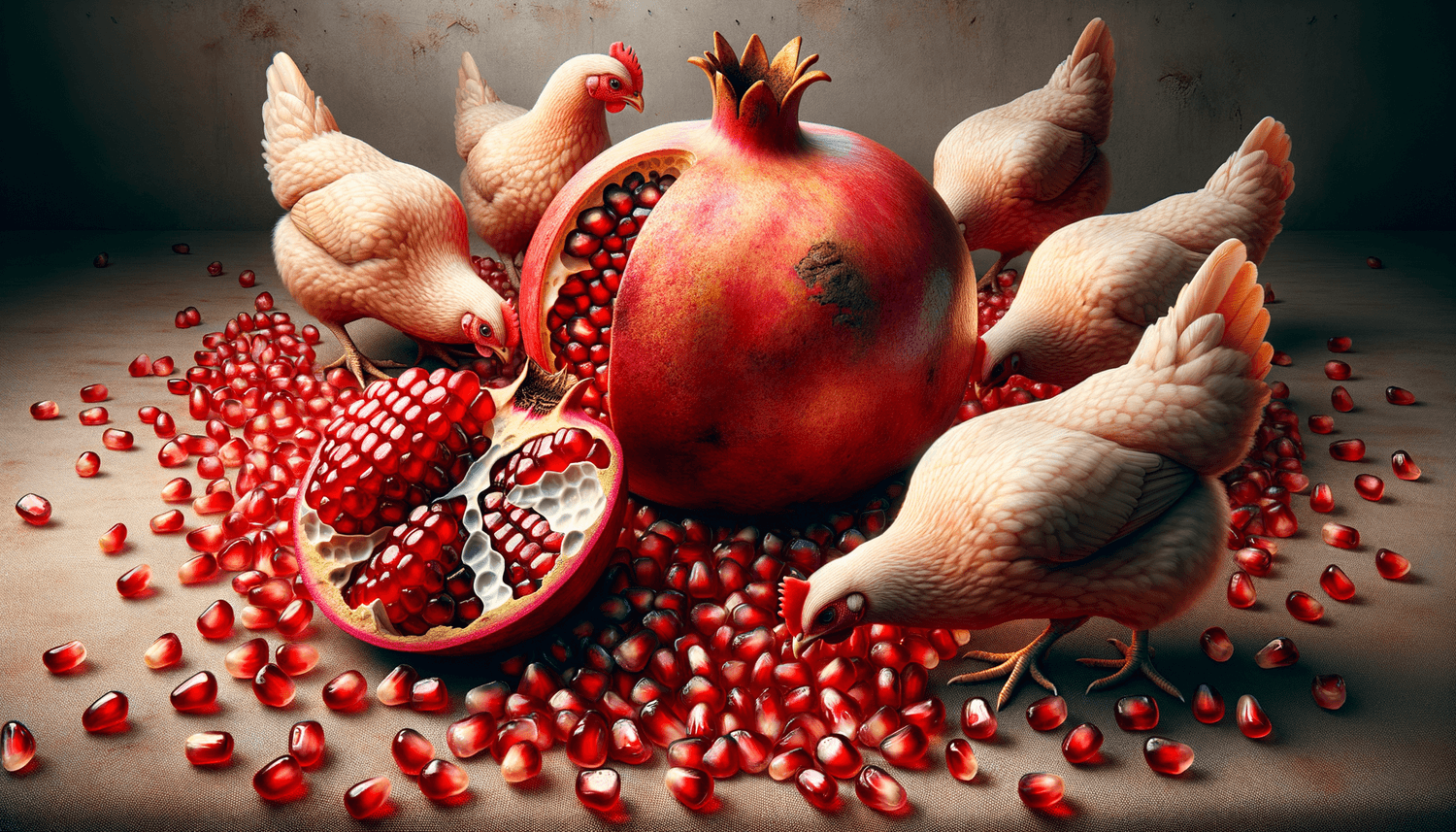What do you get when you cross curious backyard chickens with the juicy, nutrient-rich jewel that is the pomegranate seed? Inquiring coop keepers want to know! Say hello to your feathered friends as we embark on an egg-citing adventure to uncover the mystery of whether or not chickens can eat pomegranate seeds. Comb in hand, we are going to scratch the surface of the importance of a balanced diet for our peck-tacular pals, zoom in on the nutritional value of these ruby delights, and even learn how to prepare this tasty tidbit for your birds. Are you ready to flock to the facts? Let’s hatch this plan!
Can chickens eat pomegranate seeds?
Yes, chickens can safely eat pomegranate seeds! Pomegranate seeds are not only a delicious treat for your feathery friends, but they also offer a variety of nutritional benefits. Make sure to provide the seeds in moderation, as part of a balanced diet, and your chickens will peck away happily and healthily.
Just like humans, chickens need a balanced diet
Chickens, similar to their human caretakers, thrive on a balanced diet to ensure optimal health and well-being. A well-rounded diet can greatly affect the overall state of a chicken’s body, including their immune system, egg production, and plumage. To achieve this balance, it is important to know the proper ingredients that should be present in a chicken’s diet.
A high-quality chicken feed should be the primary source of nutrition for your backyard flock, accounting for around 80-90% of their diet. This chicken feed usually contains the necessary vitamins, minerals, and protein that your chickens need to thrive. By maintaining a diet that primarily consists of chicken feed, you’ll be setting a strong foundation for their health.
Now, we all love indulging in little treats every now and then, and chickens are no different! The remaining 10-20% of their diet can consist of healthy titbits such as fruits and vegetables. Keep in mind that these should be provided in moderation, ensuring the primary focus remains on a well-balanced base of chicken feed. Mixing in these delightful treats not only adds variety to their diet but also enhances their overall meal experience.
Nutritional value of pomegranate seeds for chickens.
Feeding pomegranate seeds to chickens introduces a delightful treat packed with an abundance of nutritional value for your flock. Pomegranate seeds are a rich source of vitamins, particularly vitamin C, which plays an essential role in supporting a chicken’s immune system. With a strong immune system, your chickens will be better equipped to fight off diseases and infections.
Moreover, pomegranates are an excellent source of various minerals such as potassium and calcium. Potassium is crucial to maintain proper nerve and muscle function in chickens, while calcium is essential for strong eggshells and healthy bones. An adequate intake of calcium translates to healthier, hardier chickens and fewer cracked eggs in your collection!
The hydration benefits from pomegranate seeds should not be overlooked. Pomegranates have a high water content, and providing chickens with such hydrating treats can aid in digestion, electrolyte balance, and efficient egg production. This becomes particularly important during hot summer months when the risk of dehydration is increased.
In conclusion, pomegranate seeds offer substantial nutritional value to chickens, thanks to their rich array of vitamins, minerals, and hydration benefits. These tasty treats can be incorporated into your chickens’ diet, enhancing their health and well-being along the way.
Nutrition table of pomegranate seeds for chickens.
| Information | Description |
|---|---|
| Nutritional Value | Rich in vitamins (primarily vitamin C) and minerals (potassium and calcium) |
| Suggested Serving Size | Small portions as treats, making up no more than 10-20% of their diet |
| Safe Feeding Practices | Offer in moderation, along with a balanced diet of high-quality chicken feed |
| Preparation | Remove seeds from the fruit; provide raw or slightly mashed to chickens |
| Potential Risks | Overfeeding can lead to an imbalanced diet and obesity; always feed in moderation |
| Hydration | High water content helps with digestion, electrolyte balance, and efficient egg production |
| Digestion | Easily digestible when offered in small amounts and proper preparation |
| Seasonal Availability | Typically available in the fall and winter months, depending on your location |
| Other Benefits | Strengthens immune system, supports nerve and muscle function, and maintains healthy eggshells |
Preparing pomegranate seeds for chickens
When it comes to giving your chickens pomegranate seeds, proper preparation is key. First, remove the seeds from the fruit, leaving behind the outer rind and inner membranes. You can either provide the seeds to your chickens as they are or slightly mashed to make them more manageable for the flock to peck on. Just remember that moderation is essential, and make sure to introduce these delightful treats gradually to ensure smooth digestion and avoid any potential issues.
Keep an eye on your flock
As a responsible chicken keeper, it’s important to closely observe your flock when introducing any new food item. Monitor their health and well-being while they enjoy the pomegranate seeds, and watch for any signs of allergies, digestive issues, or changes in behavior. In most cases, a small serving of pomegranate seeds should cause no harm, but every chicken is different, and individual tolerances can vary.
Alternate treat options
While pomegranate seeds can be a nutritious and tasty snack for your backyard chickens, it’s a good idea to introduce a variety of fruits and vegetables for a more balanced and diverse diet. Berries, leafy greens, chopped vegetables, and even nutritious scraps such as cooked rice or pasta can also make great treats for your flock. Always research new food items before feeding them to your chickens, as not all human foods are safe or suitable for them. Happy feeding!

















